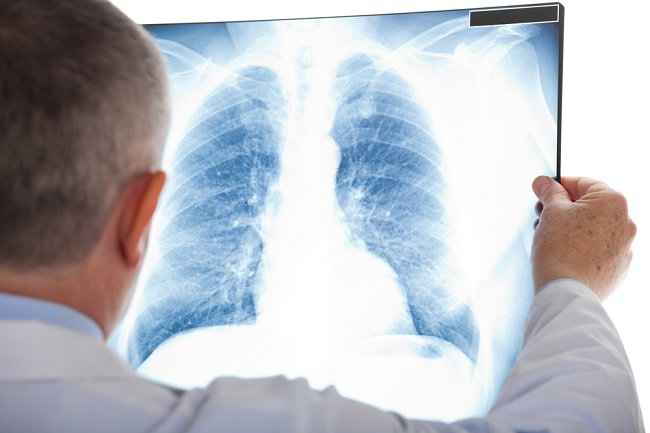Know the Types of Pneumonia
There are several types of pneumonia that can be distinguished based on the microorganism that causes it and the place of infection. Pneumonia itself is a lung infection disease that can cause air sacs in the lungs to be filled with fluid or pus.
The lungs consist of many small air sacs called alveoli. When pneumonia occurs, where the lungs are infected by certain microorganisms, the alveoli that are supposed to contain air can be filled with fluid or pus. 
Types of Pneumonia Based on the Causes
Based on the microorganism that causes infection, pneumonia can be divided into several types, namely:
1. Bacterial pneumonia
Bacterial pneumonia is pneumonia due to bacterial infection. This is the most common type of pneumonia, and the bacteria that most commonly causes lung infections is Streptococcus pneumoniae.
You can get the bacteria that causes pneumonia if you inhale droplets (small-sized saliva splashes) that people with pneumonia release when they cough or sneeze. Infection can more easily occur if you have a weak immune system, a history of lung disease, frequent smoking, or are recovering after surgery in the hospital.2. Atypical pneumonia
This type of pneumonia is actually still caused by bacteria, but the symptoms are milder than bacterial pneumonia. Because the symptoms of pneumonia are mild, sufferers usually don't realize that they are sick. This condition is called walking pneumonia. Atypical pneumonia is usually caused by the bacteria Mycoplasma pneumoniae or Chlamydophila pneumoniae.
3. Viral pneumonia
Various types of viruses can infect the lungs and cause this type of pneumonia. Viral pneumonia usually lasts shorter than bacterial pneumonia and symptoms are milder.
However, sometimes cases of viral pneumonia can also be fatal, especially if the cause is influenza virus. Children, the elderly (elderly), and people who have weak immune systems are more at risk for experiencing fatal viral pneumonia.
4. Fungal pneumonia
This type of pneumonia is caused by fungal infections. Fungal pneumonia is rare and is usually experienced by people who suffer from chronic diseases or have a weak immune system. Examples are AIDS sufferers, cancer sufferers who are undergoing chemotherapy, autoimmune disease sufferers, or organ transplant recipients who have to take immune system-suppressing drugs (immunosuppressants).
Types of Pneumonia Based on the Location of the Infection
Microorganisms that cause pneumonia can be obtained from various places. Pneumonia obtained from different places has different characteristics.
1. Hospital-acquired pneumonia (HAP)
Pneumonia that is obtained when a person is being treated in a hospital is called hospital-acquired pneumonia (HAP) or nosocomial pneumonia. The reason for hospitalization does not have to be lung disease. All patients who are being hospitalized for any disease have a risk of being exposed to bacteria while in the hospital.HAP is usually serious because the bacteria that causes it are often resistant (resistant) to antibiotics. A patient who is hospitalized is more at risk of developing this type of pneumonia if:
- Requires ventilator breathing apparatus while being treated
- Cannot cough normally, so phlegm in the lungs and throat cannot be removed
- Having a tracheostomy, which is an artificial hole in the neck that has been fitted with a tube to help with breathing
- Having a weak immune system
2. Health care-acquired pneumonia
Unlike HAP that occurs in hospitals, pneumonia can occur in other health facilities, such as hemodialysis (dialysis) centers or outpatient clinics. Street. Bacteria obtained from these sites can also be resistant to antibiotics.
3. Community-acquired pneumonia (CAP)
This type of pneumonia includes all pneumonia obtained outside hospitals and health facilities. Community-acquired pneumonia (CAP) can be caused by bacteria, viruses or fungi. One example of CAP is pulmonary tuberculosis (pulmonary TB).
This type of pneumonia also includes aspiration pneumonia, which is a type of pneumonia that occurs when a person accidentally inhales food, drinks, or vomit into his airway. This condition usually occurs in people who have swallowing and vomiting disorders.
Not all cases of pneumonia are fatal. Mild pneumonia can usually be treated at home using medicines according to doctor's instructions. However, severe pneumonia requires intensive treatment in hospital because it can end up being respiratory failure or sepsis.
If you experience symptoms of pneumonia, such as shortness of breath, coughing, and fever, see your doctor immediately. If you find that you have pneumonia, your doctor will determine the right treatment for the type of pneumonia that you are suffering from.
To prevent pneumonia, you are advised to always maintain endurance by exercising regularly, eating nutritious foods, and not smoking. Don't forget to wash your hands thoroughly, especially before touching your face, and get a vaccine for pneumonia if necessary.
Written by:
dr. Irene Cindy Sunur
Label : Health
Comments
Post a Comment